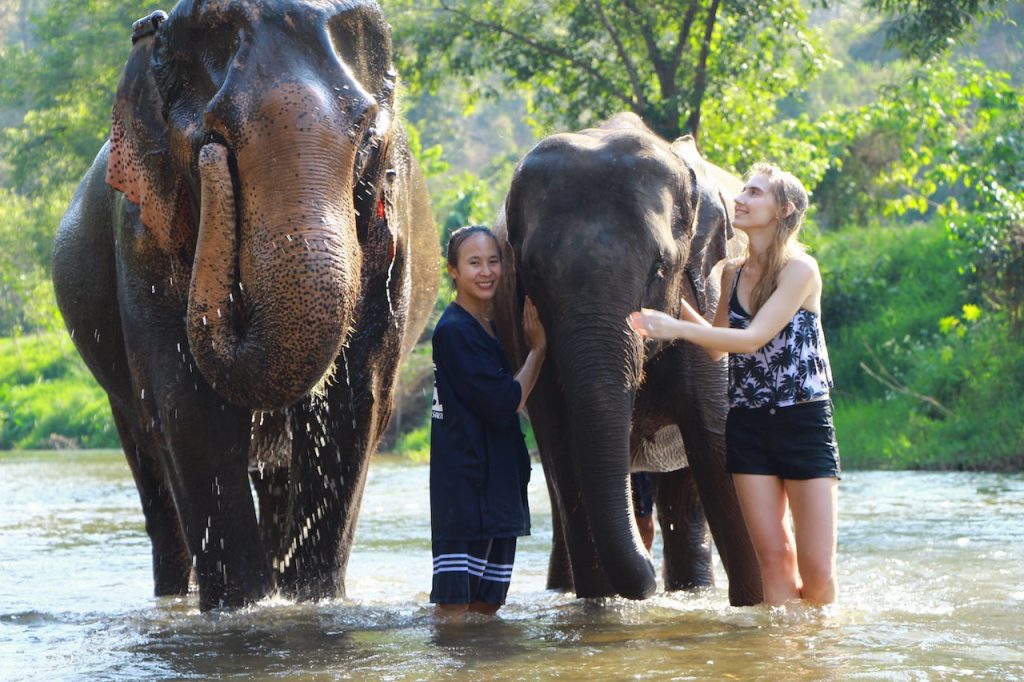Thailand Elephants:
Coronavirus effect situation
Thailand Elephants: starving and in cages

Blog on Travel
Thailand Elephants: starving and in cages, is facing a Coronavirus effect situation
Famished, chained for countless hours, almost all of Thailand’s elephants that work in Thailand’s tourism industry will starve to death, be sold to zoos, or be forced through illicit logging.
Before the outbreak, life was already difficult for the estimated 2,000 elephants in the Kingdom employed in tourism, with coercive practices used to “transform them” into riding and displays of the capital. With the world, travel paralyzed the animals can not continue to survive, even 300 kg of food a day.
Conservationists and elephant camps speak of hunger, and without an immediate rescue, there is a risk of increased mining.
One of the elephant handlers, says of the Chiang Mai camp where his elephant lives on an infinite diet. “My boss does what he can, but we don’t have money.”
Chiang Mai is the northern tourism center of Thailand, a city of rolling hills with camps and sanctuaries, ranging from egalitarian to exploitative.
Footage sent from another camp in the area to AFP shows elephant lines tackling wooden poles with their foot, some of them agitated and shaking their heads back and forth.
The Thai Elephant Alliance Association’s representative, Theerapat Trungprakan, claims about 2,000 elephants are reportedly “unemployed” as the epidemic eviscerates the tourism industry in Thailand.
The shortage of cash limits the available fibrous foods for the “physical-effecting” elephants, he added. The wages of mahouts who take care of them have dropped by 70%.
In contravention of a 30-year-old law banning the use of elephants in the transport of timber, Theerapat fears that it may soon be used by creatures in illicit logging operations on the Thai-Myanmar border.
Others, he added, “may (become beggars) be driven into the streets.”
This is another subplot in the story of elephant exploitation which campaigners for animal rights had been fighting for far too many efforts to protect against the neglectful tourist industry.
The slump began in late January with those hawking once in a lifetime with the massive creatures from afar or up.

In February, Chinese travelers making up most of Thailand’s 40 million tourists fell by over 80% as China shut downtowns that had been seriously impacted by the virus and prohibited international travel.
In March the sanctions on Thailand spread to Western countries-1,651 reported cases of the virus. The condition is “at a moment of crisis,” said Saengduean Chailert, owner of Elephant Nature Parc, as elephants are being steadily underfed by revenue loss.
Its shelter for around 80 saved pachyderms only allows travelers, in comparison to areas where they can do tricks and give tours, to watch the living creatures.
In nearly 50 camps around the world, they have coordinated a fund to feed electives and support mahouts, which will soon be restricted to zoos, starvation, or logging.

One of the park rangers says that tension could lead to combat for those who are confined to short chains all day long in camps where the creatures can no longer be medically treated.
Moreover,the Elephant Rescue Park manager Apichet Duangdee mentioned that “For a single elephant we need a thousand (US$ 30) baht a day.”
It’s out of the question to free his eight mammals from circuses and loggers to the jungle because they will certainly be slaughtered by wild elephants in territorial wars.
He expects to take a US$ 61.000 (2 million) loan to keep his elephants alive early. “I’m not going to give them up,” he added.
The elephants future in our hands, they need proper nourishment, shelter, and care. Please help and support the camps and their caretakers. They badly need our kind contribution in order to save these beautiful creatures. Share away to family and friends and spread the word.








